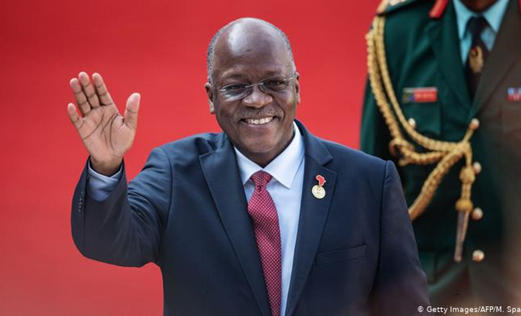Vice President Samia Suluhu Hassan announces death of 61-year-old after weeks of uncertainty over his health and whereabouts.
Magufuli was first elected in 2015 on promises to tackle corruption and boost infrastructure development [File: Sadi Said/Reuters]
Tanzanian President John Magufuli has died, the country’s vice president announced, after weeks of uncertainty over his health and whereabouts.
In a televised address to the nation late on Wednesday, Vice President Samia Suluhu Hassan said the 61-year-old president had died of a “heart condition”, which he had suffered for 10 years at a hospital in Dar-Es-Salaam.
Flags flew at half-mast in Tanzania, as the country began a 14-day mourning period.
Magufuli had first been briefly admitted to the Jakaya Kikwete Cardiac Institute on March 6, but was subsequently discharged, Hassan said on state television. But he was rushed to hospital again on March 14 after feeling unwell.
After the death was announced, opposition leader Zitto Kabwe said he had spoken to Hassan to offer condolences for Magufuli’s death.
“The nation will remember him for his contribution to the development of our country,” Kabwe said in a statement published on Twitter.
According to Tanzania’s Constitution, Hassan, 61, should assume the presidency for the remainder of the five-year term that Magufuli began serving last year after winning a second term. She is set to become the country’s first female leader.
The announcement of the president’s death came after government denials that the president was ill. Pressure mounted to explain his almost three-week absence from public view, which sparked panic and rumours he was seeking treatment abroad for COVID-19.
Main opposition leader Tundu Lissu, shot 16 times in a 2017 assassination attempt and exiled in Belgium, described Magufuli’s death as “poetic justice”, insisting his sources said he had succumbed to COVID-19.
“Magufuli died of corona. That is one. Number two, Magufuli did not die this evening. I have information from basically the same sources which told me he was gravely ill, I have information that Magufuli has been dead since Wednesday of last week,” he told Kenya’s KTN News, using local slang for the virus.
A vocal COVID-19 sceptic, Magufuli had last appeared in public on February 27 and top government officials had denied that he was in ill health, even as speculation swirled online that he was sick and possibly incapacitated from the disease.
Magufuli had long downplayed the severity of COVID-19, urging Tanzanians to pray, use steam inhalation and embrace local remedies to protect themselves from the respiratory disease.
Tanzania stopped releasing infection numbers in April 2020, weeks before Magufuli declared in June that the country was coronavirus-free due to divine intervention.
He refused to wear a face-mask or take lockdown measures. But a week before he was last seen, Magufuli conceded the virus was still circulating, after the vice president of semi-autonomous Zanzibar was revealed to have died of COVID-19.
The ‘Bulldozer’
Nicknamed the “Bulldozer”, Magufuli was elected in 2015 on promises to tackle corruption and boost infrastructure development.
However, a slide into authoritarianism, which saw a crackdown on the media, civil society and opposition, raised alarm among foreign allies and rights groups.
His re-election last October was dismissed by the opposition and some diplomats as a sham due to alleged rigging, the blocking of foreign media and observer teams and an oppressive military presence.
Some analysts said that Magufuli had dealt a crushing blow to democracy in one of Africa’s most stable nations.
However he also won plaudits for expanding free education, rural electrification and investing in infrastructure projects such as railways, a hydropower dam set to double electricity output and the revival of the national airline.
His government passed a raft of laws to increase Tanzania’s stake in its mineral resources and demanded millions in back taxes from foreign mining companies.
But it was Magufuli’s handling of the coronavirus pandemic which cast his leadership style into sharp relief.
Critics said that Magufuli’s dismissal of the threat from COVID-19, as well as his refusal to lock down the country, may have contributed to many unknown deaths.
Magufuli was born in Tanzania’s northwestern Chato district, on the shores of Lake Victoria, where he grew up in a grass-thatched home, herding cattle and selling milk and fish to support his family.
“I know what it means to be poor,” he often said.
He was awarded a doctorate in chemistry from the University of Dar es Salaam and also spent some time studying at Britain’s University of Salford.
Magufuli was a member of the ruling Chama Cha Mapinduzi (CCM) party, which has been in power since independence from Britain in the early 1960s.
A member of parliament since 1995, he held various cabinet portfolios, including livestock, fisheries and public works, where he earned the “Bulldozer” moniker.
Magufuli was married with five children.



